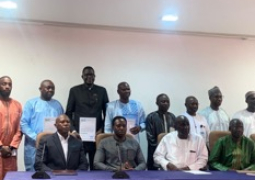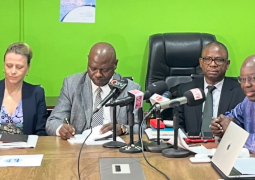
The ceremony, held at State House in Banjul, drew farmers, local leaders, and government officials, who hailed the initiative as a turning point for the country’s agricultural sector.
The delivery of the tractors forms part of a broader national strategy aimed at transforming traditional farming practices, increasing productivity, and ensuring food self-sufficiency. Farmers welcomed the initiative with optimism, viewing it as a tangible sign of the administration’s commitment to transforming the agricultural sector and honouring its promises.
It may be recalled that during one of the President’s “Meet the People’s Tours, the Gambian leader announced his administration’s plan to procure 200 tractors for farmers, aimed at alleviating their challenges. Officials have stated that today’s handing over of the tractors is a clear manifestation of that commitment.
The initiative is based on a co-financing and co-management model, designed to promote ownership, sustainability, and accountability between the government and beneficiary farmers. Under this arrangement, farmers are required to make an upfront payment of 25% before receiving a tractor. The government will contribute an additional 25%, while the remaining 50% will be financed and repaid by the farmers over a period of four years.
The 60 tractors form part of a total of 180 that will be procured by the government and distributed to farmers. This initiative is designed to complement their efforts, boost agricultural yield and production, and ensure that the labour-related challenges they previously faced become a thing of the past.
Officials stated that the 60 tractors, each with a capacity of 75 horsepower, are accompanied by 18 disc harrows and 10 tipping trailers. Alongside these items are other modern implements, such as rotary tillers, seed drills, and planters.
The mechanisation programme is expected to significantly reduce the labour burden on farmers, improve yields, and encourage youth participation in agriculture. With over 70% of Gambians relying on farming for their livelihoods, the introduction of modern equipment is seen as essential to unlocking the sector’s full potential.
Officials from Yonna Group, who co-finance 50% of the tractors, stated that this initiative represents more than just business—it reflects their long-term investment in The Gambia’s prosperity. They added that they are putting their capital where their convictions lie, demonstrating their belief in our farmers and the nation’s agricultural potential through a substantial financial commitment.
Addressing the gathering, President Barrow reaffirmed his administration’s commitment to tackling the challenges faced by Gambian farmers, noting that agriculture remains the backbone of the nation’s economy.
“The event marks another significant milestone in my government’s strides to modernise agriculture in the country and our collective journey towards food self-sufficiency nationwide,” he said.
He added: “The assets lined up here are part of a bigger package of 180 tractors and accessories that the government, through the Ministry of Agriculture, Livestock, and Food Security, procured for our farming communities. I commend Yonna Agribusiness, the supplier, for their collaboration in realising this goal.”
The distribution of these tractors, Barrow continued, reaffirms his government’s irreversible resolve to transform agriculture into a mechanised, efficient, and business-oriented sector.
“Mechanisation is imperative if we are to feed our growing population, create jobs for our youth, and reduce our import bill. To get the most out of it, however, we must mechanise responsibly, transparently, and sustainably. That is why a co-financing model has been introduced to ensure ownership and accountability from both the government and beneficiaries of the initiative.”
President Barrow further explained: “Within this arrangement, while the Government of The Gambia will shoulder 25% of the total cost, the beneficiary farmer or farmer group will contribute 25% upfront to receive a tractor and its implements. The remaining 50% is payable over a four-year period, with the government acting as guarantor.”
“To safeguard this investment, the Ministry of Agriculture, Livestock, and Food Security and the farmer will sign a contractual agreement. It will cover management issues, repayment arrangements, and oversight functions. The Ministry’s Agricultural Engineering Services will develop and implement a maintenance and repair plan.”
“We must not allow anyone to waste or mismanage such public investments. These tractors are not gifts. They are instruments of growth, procured within the framework of shared responsibility for service and maximum productivity. Consequently, violation of any contractual agreement may lead to the withdrawal of the equipment or the application of other appropriate measures.”
Mohammad Manjang, chairman of Yonna Group, underscored the significance of the tractors in the country’s quest for food self-sufficiency, adding:
“These tractors address the root causes of rural poverty that have driven many of our young people to seek opportunities elsewhere, often through perilous paths. When agriculture becomes productive and profitable, it creates ripple effects that transform entire communities.”
He continued: “The Gambia spends millions annually importing food that we can produce locally. This dependency undermines our sovereignty and exposes our people to global price shocks. These tractors represent our march towards food self-sufficiency.”
“With mechanisation, farmers can increase yields dramatically. Where a farmer previously cultivated two hectares manually, these tractors enable the cultivation of 10 hectares or more. This means rice self-sufficiency and reduced costly imports. Surplus production generates foreign exchange through exports, price stability shields consumers from volatile international markets, and food security ensure no Gambian goes hungry.”
Alhagie Ceesay, speaking on behalf of Gambian farmers, underscored the transformative impact of tractors on agricultural productivity, saying:
“If we were producing eight bags using manual labour, with the help of these tractors, we will produce dozens.”
Ceesay went on to commend the Barrow administration for what he described as “unprecedented support” to the farming community since coming to power. He expressed optimism about the future of agriculture in The Gambia, noting:
“If they continue with such support, each compound in the country will likely have a tractor.”
He further highlighted improvements in access to fertilisers and market prices, stating:
“We have enough fertilisers, sold at affordable prices. Our groundnuts are being bought at rates higher than even in neighbouring countries.”
Ceesay concluded by urging farmers to take ownership of the equipment provided and ensure the sustainability of the tractor initiative.





